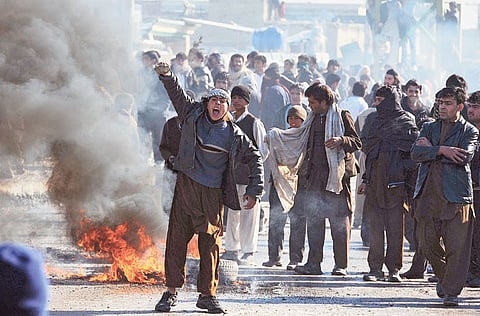America's Afghan quagmire
News of the Quran burning was a catalyst that ignited resentment against the US-led coalition

Close your eyes, and imagine the following situation ... Suppose the town or city where you live had a bunch of heavily-armed foreign soldiers living nearby. As part of their normal duties, they sent patrols down your street with some frequency, bristling with guns and other instruments of war.
Imagine that these soldiers were from a very different culture and nearly all of them did not speak your native language, although they could occasionally use a local translator to order you around.
You have been told repeatedly that they are there to protect you, but sometimes these protective activities involve entering your neighbours' houses, arresting people, and even shooting up the place.
Of course, these well-armed foreign troops have access to lots of sophisticated airpower, including helicopters, fighter-bombers, and drones, and these sophisticated gadgets fire missiles and drop bombs on suspected bad guys in your city, town, or village.
Most of the time it appears that the foreign occupiers get who they were aiming at, but sometimes they make mistakes and kill your friends and neighbours. Maybe even one of your close relatives.
The question I'd ask you is this: If you had been living in such circumstances for five or 10 years, do you think you and your neighbours might become resentful of those well-intentioned but heavy-handed foreigners? Do you think you might even begin to hate their intrusive interference, even if it were done with the best of intentions?
If you then discovered that some of them were burning Bibles, Torahs, or the American flag, might you leave your house and join an angry demonstration, or may even try to do something worse? If the answer to those questions is ‘yes,' then you can probably understand why the United States and its allies are in such deep water in Afghanistan.
You see, the outburst of public rage at the burning of copies of the Quran actually tells you something very important about America's Afghan campaign. It's not as if the news about this act suddenly swung lots of Afghans from being really fond of the US to being really mad at Americans.
Rather, news of the Quran burning was just a catalyst — the proverbial straw on the camel's back — that ignited resentments that have been building up for a long time. The fact is: Nobody likes being ordered around by a tough and well-armed bunch of foreigners, and no amount of ‘hearts and minds' feel-good diplomacy can eliminate that fact.
Troop surge
That is one of the many reasons why the Obama administration was wrong to escalate the Afghan war in 2009, and why neoconservative supporters of the Afghan ‘surge' were as wrong about that as they were about the similar surge in Iraq.
Sending more troops to Afghanistan escalation didn't alter the trajectory of the war in any fundamental way, and a recent article in Armed Forces Journal (http: www.armedforcesjournal.com/2012/02/8904030) suggests that Americans have been fed a bill of goods about the real conditions there.
The Afghan reaction to the Quran burning is one of those moments of clarity where the real landscape is revealed, and it's not a pretty sight. And now, all Americans need to do is imagine an administration that can face these facts squarely and bring this misguided effort to an end.
I can't guarantee that President Barack Obama would do it in his second term (after all, he whiffed on this decision the first time around), but I'd bet he's more likely to do it than the people who hope to challenge him in November.
Stephen M. Walt, a Foreign Policy writer, is the Robert and Rene Belfer professor of international relations at Harvard University.


